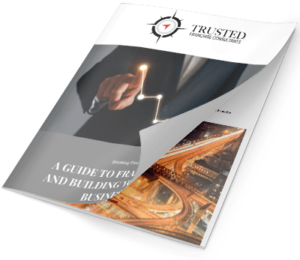SBA 7(a) loans are a form of small business loan offered by the Small Business Administration (SBA) that are made to help small businesses get the money they require to launch or grow their chosen franchise.
These loans are less riskier for lenders than conventional business loans since the government backs them.
The business loan experts at Trusted Franchise Consultantscan help you understand what you need to know about SBA 7(a) loans, including how to meet the requirements, how to apply, and what to anticipate during the process.
What is an SBA 7(a) Loan?
These loans are guaranteed by the SBA loan, which means that the government backs the loan and provides lenders with security and assurance.
The 7(a) program is the SBA’s primary loan program and offers a wide range of options for small businesses, including working capital loans, equipment financing, and real estate purchases.
With flexible terms and competitive interest rates, SBA 7(a) loans are a popular choice for small business owners looking for financing to help take their business to the next level.
Whether you’re just starting or looking to expand, an SBA 7(a) loan can be a valuable tool for your small business.
Eligibility Requirements
We understand the importance of small business financing, so we offer SBA 7(a) loans to help small businesses grow and thrive.
Here are some of the key eligibility requirements to consider when applying for an SBA 7(a) loan through our organization:
Who Can Apply for an SBA 7(a) Loan
- Small businesses with a sound business plan and the ability to repay the loan
- Businesses that are located in the United States and are either for-profit or non-profit
- Businesses that meet the SBA’s size standards, which vary depending on the industry
What Types of Businesses are Eligible
- Most businesses are eligible for an SBA 7(a) loan, including retail, manufacturing, service, and many others that help you expand, purchase new equipment, refinance loans, and the like.
- Certain types of businesses, such as passive businesses or those engaged in illegal activities, are not eligible.
Credit Score and Financial Requirements
- A credit score of at least 640 is typically required.
- Businesses must be registered as for-profit businesses.
- Businesses must have had a net income of less than $5 million for the past two years.
- Businesses must have a net worth of less than $15 million.
If you meet these eligibility requirements and are interested in applying for an SBA 7(a) loan through Trusted Franchise Consultants, don’t hesitate to contact us to learn more about the application process and requirements. We are here to help you secure the funding you need to grow and succeed.
SBA Loan Application Process
Applying for an SBA 7(a) loan at Trusted Franchise Consultants is straightforward. Our team of experts will guide you every step of the way to ensure that you have the best chance of getting approved for the loan you need.
Here’s a step-by-step guide on how to apply for an SBA 7(a) loan at Trusted Franchise Consultants:
How to Apply for an SBA 7(a) Loan
- Contact an SBA-Approved Lender: Once you’ve decided on the best loan option, you’ll need to provide all the necessary documentation and information. It includes your credit score, personal and business financial statements, business plans, tax returns, and loan application paperwork that has been completed.
- Find the Right Option for You: There are various SBA 7(a) loans available, and our team will assist you in determining the best option for your company’s needs.
- Submit Documentation: Once you’ve decided on the right loan option, you’ll need to submit all the required documentation and information. It includes your credit score, personal and business financial statements, business plans, tax returns, and completed loan application paperwork.
- Assessment: The lender will then assess across many categories whether or not you are eligible for the loan amount requested. It can take up to a few weeks.
- Approval and Loan Closing: If the lender finds everything to be in order, they will approve your loan, and then you will begin your loan closing process. This step will also involve a lot of paperwork and signing, but in the end, you will come out with an approved SBA loan.
Required Documentation and Information
- Personal and business financial statements
- Business plans
- Tax returns
- Completed loan application paperwork
- Credit score
- And more
Timeline for Approval and Disbursement
- The assessment process can take up to a few weeks.
- The loan closing process can also take some time and involve a lot of paperwork and signing.
At the Trusted Franchise Consultants, we aim to make applying for an SBA 7(a) loan as easy and stress-free as possible.
Loan Terms and Repayment
At Trusted Franchise Consultants, finding the correct loan terms and repayment options can be overwhelming. We have put together this guide to help you understand your options.
Amounts and Terms Available
Our loan amounts range from $30,000 to $5 million, allowing you to choose the amount that best suits your needs. We offer terms that are tailored to your specific situation and can be customized to meet your unique requirements.
Interest Rates and Fees
Our 7(a) loans come with interest rates that range from 5% to 10%. We also have a variety of fees that may apply, depending on your loan amount and terms. We’ll work with you to find the best interest rate and fee structure to fit your budget and needs.
Repayment Options and Terms
We offer a variety of repayment options to fit your specific situation. For most loans, repayment is expected within ten years, but we can work with you to find a repayment schedule that works best for you. We also offer flexible repayment terms, including deferred and interest-only payments, to help you manage your cash flow and budget.
At the Trusted Franchise Consultants, we’re committed to providing you with the best loan terms and repayment options to meet your needs.
Advantages and Disadvantages of SBA 7(a) Loans
Pros of SBA 7(a) Loans
SBA 7(a) loans can provide a variety of advantages for small businesses looking to secure financing. Some of the pros of SBA 7(a) loans include:
- Longer repayment terms: SBA 7(a) loans typically have longer repayment terms than traditional business loans, which can help to lower monthly payments and make it simpler for businesses to control their cash flow.
- Lower down payments: SBA 7(a) loans typically require lower down amounts than traditional business loans, which can help to conserve working capital and make it easier for businesses to secure financing.
- Guaranteed by the SBA: The SBA guarantees a portion of SBA 7(a) loans, making it easier for small businesses to qualify and helping to reduce the risk for lenders.
- Flexible use of funds: SBA 7(a) loans can be used for various purposes, including purchasing equipment, real estate, or working capital.
- Credit Building: SBA 7(a) loans can help small business owners to build their credit scores and improve their chances of getting approved for future loans.
At the Trusted Franchise Consultants, we are committed to helping small businesses secure the financing they need to grow and succeed. With our expertise in SBA 7(a) loans, we can help you determine if this financing is right for your business and guide you through the application process.
Cons of SBA 7(a) Loans
SBA 7(a) loans can provide various benefits to small businesses, but it’s important to consider the cons before applying. Some cons of SBA 7(a) loans include:
- Longer approval process: The SBA 7(a) loan process can take longer than other types of business loans because of the additional requirements and documentation needed.
- Complex application process: The SBA 7(a) loan application process can be more complex and time-consuming than other business loans.
- Higher interest rates: SBA 7(a) loans may have higher interest rates than other types of business loans, which can increase the overall cost of the loan.
- Strict qualifications: Businesses must meet specific qualifications, such as being a for-profit company and having a certain annual revenue level.
- Collateral requirements: Equipment or real estate, which can put personal assets at risk.
It is important to consider the possible benefits and cons of an SBA 7(a) loan before applying and consider alternative options if they better suit your financial needs.
SBA 7(a) Loans Frequently Asked Questions
What are Some Alternative Options to an SBA 7(a) Loan?
Some alternative options to an SBA 7(a) loan include traditional bank loans, equipment financing, invoice factoring, crowdfunding, and peer-to-peer lending.
Are There Any Prepayment Penalties for SBA 7(a) Loans?
No prepayment penalties exist for SBA 7(a) loans. Borrowers can pay off their loans early without incurring additional fees or penalties.
Are There Any Collateral Requirements for SBA 7(a) Loans?
Yes, there are collateral requirements for SBA 7(a) loans. The SBA generally requires that the borrower pledge all available assets as collateral for the loan, including real estate, equipment, inventory, and accounts receivable. However, SBA also allows for exceptions based on the borrower’s creditworthiness and the type of loan being applied for.
Can an SBA 7(a) Loan Be Used to Refinance Existing Debt?
Yes, an SBA 7(a) loan is used to refinance existing debt, as long as the debt being refinanced is considered “good debt,” and the loan profits will be used for a valid business purpose.
Is There Any Difference Between SBA 7(a) Loans and Traditional Bank Loans?
There are several differences between SBA 7(a) loans and traditional bank loans. SBA 7(a) loans are backed by the Small Business Administration (SBA) and have more flexible terms, such as more extended repayment periods and lower down payments. They also have lower credit score requirements and can be used for a broader range of business purposes, including startup costs and working capital. Traditional bank loans typically have stricter terms and qualifications and may be less readily available for small businesses.
Can an SBA 7(a) Loan be Used to Purchase a Franchise?
Yes, an SBA 7(a) loan is used to purchase a franchise. The Small Business Administration (SBA) 7(a) loan program is a government-guaranteed loan program that provides financing for various business purposes, including purchasing an existing business or franchise. The franchisee must meet specific SBA requirements, such as being a legally operating business and meeting specific size standards. Additionally, the borrower must also meet the SBA’s credit qualifications.
Can an SBA 7(a) Loan be Used to Purchase a Commercial Property?
Yes, an SBA 7(a) loan is used to purchase a commercial property. The loan is used for various business purposes, including real estate purchases, equipment purchases, working capital, etc. The loan is also used for refinancing existing debt.
Are There Any Restrictions on How SBA 7(a) Loan Proceeds Can Be Used?
Yes, an SBA 7(a) loan’s proceeds are only used for specific business purposes such as working capital, equipment purchases, real estate acquisitions, and certain types of refinancing. The loan isn’t used for illegal activities, investments in speculative ventures, or personal expenses.
Are There Any Limitations on the Number of SBA 7(a) Loans a Business Can Take out?
Yes, there are limitations on the number of SBA 7(a) loans a business can take out. The SBA has a maximum aggregate loan limit of $5 million for all 7(a) loans in a fiscal year. Additionally, each loan has its specific loan limit based on the type of loan and the purpose of the funds.
Can a Non-US Citizen Apply for an SBA 7(a) Loan?
A non-US citizen can apply for an SBA 7(a) loan as long as they have a valid tax identification number and meet the other eligibility requirements set by the SBA.
The SBA 7(a) loan program is a valuable resource for small business owners looking for financial assistance. Some key points to consider are the flexible use of funds, the potential for longer repayment terms, and the ability to secure a loan with a lower down payment.
Why Choose the Trusted Franchise Consultants to Guide you Through the SBA Loan Process?
For business owners considering an SBA 7(a) loan, we recommend consulting with a qualified loan specialist to determine if this program fits their business needs. Additionally, it is important to understand the application process and necessary documentation clearly.
We also recommend visiting the Trusted Franchise Consultants website for more information on the 7(a) loan program and other resources that may be available to small business owners.
If you need further assistance, please don’t hesitate to contact us at (208) 254-4324 or email us at jack@trustedfranchiseconsultants.com .Trusted Franchise ConsultantsTrusted Franchise Consultants









